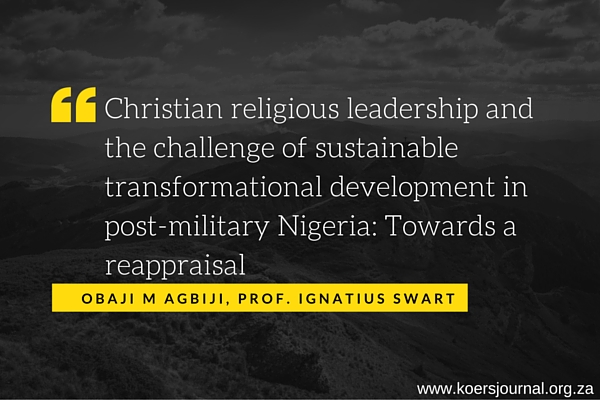Abstract
Abstract
This article seeks to make an initial contribution towards a reappraisal of how the Christian religious leadership in Nigeria is beginning to chart a new course in social transformation that has the potential to engender sustainable transformational development in the country. This aim is met by first providing the necessary contextual orientation of how the two broad areas of political governance and economic development present themselves as prevailing major social challenges in present-day post-military Nigeria. This is followed by a discussion of the role of leadership as a primary causal and redeeming factor in meeting the challenge of sustainable transformational development both in Nigeria and African society at large. The authors proceed then towards the main focus of the article, namely to move – on the basis of a literature and empirical exploration – towards a reappraisal of how the Christian religious leadership in present-day Nigeria is beginning to exert itself as an emerging movement for sustainable transformational development through particular institutional arrangements and modes of social engagement. This reappraisal leads the authors to end with a synthesising reflection on what they consider to be not only the most outstanding contribution to date by the Christian religious leadership in present-day Nigeria in advancing a sustainable transformational development agenda, but also the crucial challenges that this leadership still faces in meeting such an agenda.
Titel: Christelike godsdienstige leierskap en die uitdaging van volhoubare transformasionele ontwikkeling in post-militêre Nigerië: Op weg na ‘n herwaardering
Opsomming
Hierdie artikel poog om ‘n eerste bydrae te maak tot ‘n herwaardering van die wyse waarop die Christelike godsdienstige leierskap in Nigerië besig is om ‘n nuwe weg te baan in sosiale transformasie wat die potensiaal het om volhoubare transformasionele ontwikkeling in dié land te bewerkstellig. Hierdie doelwit word bereik deur eerstens ‘n kontekstuele oriëntering te bied van hoe die twee breë terreine van politieke staatsbestuur en ekonomiese ontwikkeling hulself as heersende sosiale uitdagings in hedendaagse post-militêre Nigerië aanbied. Dit word gevolg deur ‘n bespreking van leierskap as ‘n primêr oorsaaklike en bevrydende faktor in die realisering van volhoubare transformasionele ontwikkeling beide in Nigerië en die samelewing van Afrika in die breë. Hierna verskuif die bespreking na die sentrale fokus van die artikel, naamlik om op grond van ‘n literatuur- en empiriese ondersoek te beweeg na ‘n herwaardering van die Christelike godsdienstige leierskap as ‘n ontluikende beweging vir volhoubare transformasionele ontwikkeling in hedendaagse Nigerië by wyse van spesifieke institusionele inrigtings en modusse van sosiale betrokkenheid. Hierdie herwaardering lei die skrywers daartoe om af te sluit met ‘n samevattende refleksie nie slegs oor wat hul beskou as die mees uitstaande bydrae tot op hede deur die Christelike godsdienstige leierskap in hedendaagse Nigerië in die bevordering van ‘n volhoubare transformasionele ontwikkelingsagenda nie, maar ook as die kritieke uitdagings wat dié leierskap steeds in die gesig staar in die voltrekking van sodanige agenda.

This work is licensed under a Creative Commons Attribution-NoDerivatives 4.0 International License.
Copyright (c) 2015 Obaji M Agbiji, Prof. Ignatius Swart


_7.png)